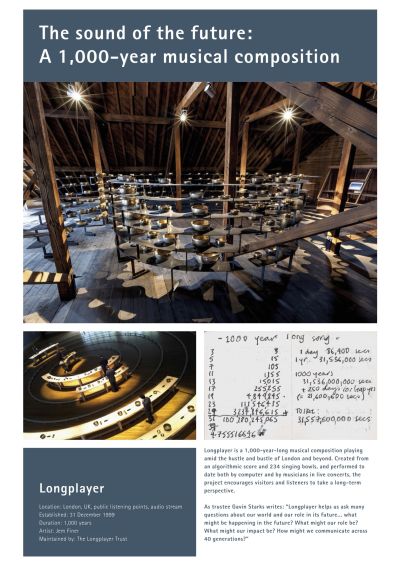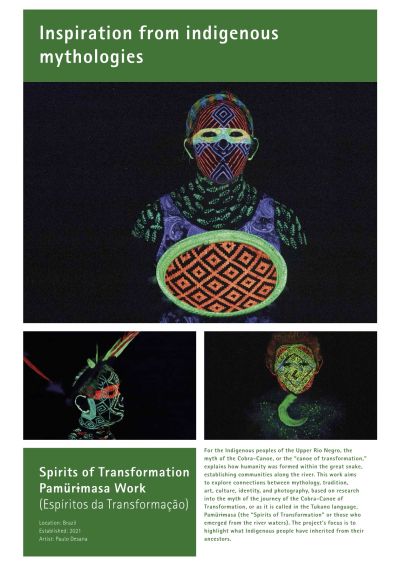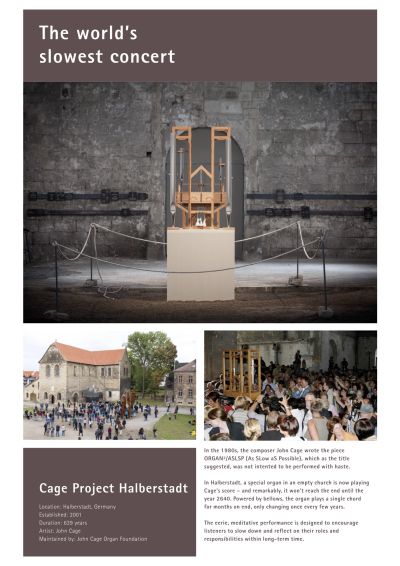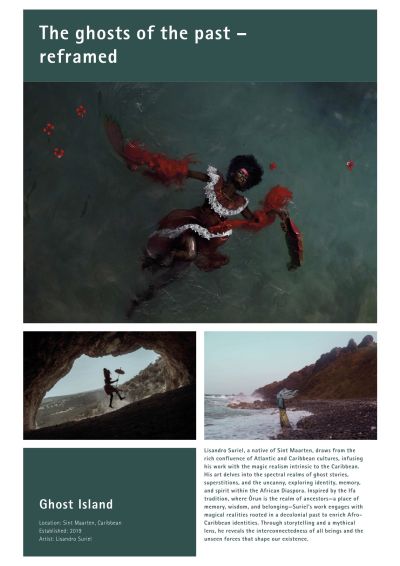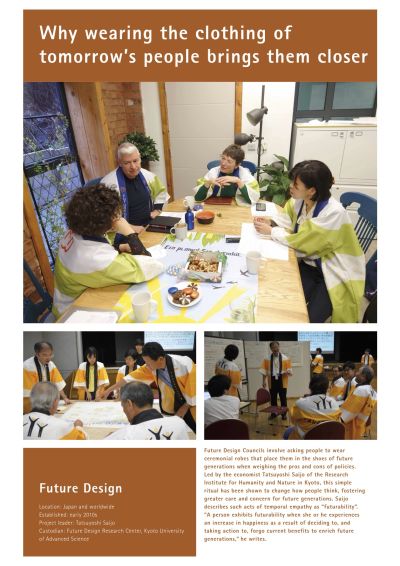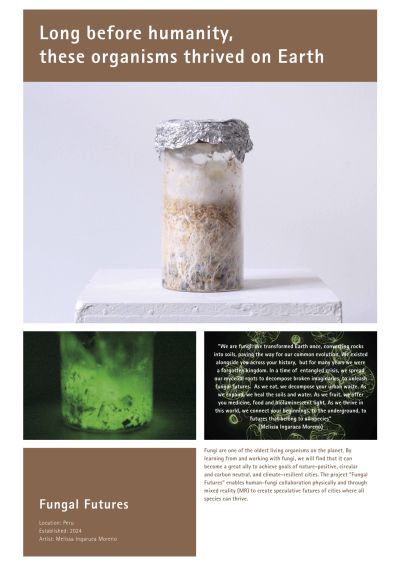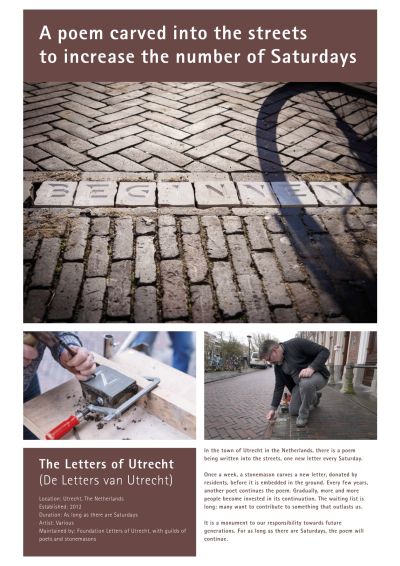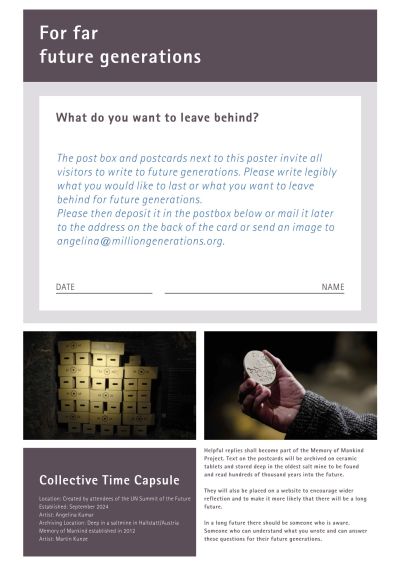Good Ancestors exhibition 2024: Difference between revisions
MGxWikiSysop (talk | contribs) |
MGxWikiSysop (talk | contribs) (→Introduction: add text) |
||
| Line 7: | Line 7: | ||
== Introduction == | == Introduction == | ||
[[File:Good Ancestors expo UN 1.jpg|400px|none]] | [[File:Good Ancestors expo UN 1.jpg|400px|none]] | ||
In the early 21st Century, short-termism is ubiquitous – and yet the world has never faced so many complex challenges that require a long term perspective to solve. | |||
On current trajectories, the planet we hand over to tomorrow's generations could be in a worse state than the one we inherited. The continued progress, or even existence, of future generations is therefore not ensured. While social, economic and technological advances enable some of us to live longer and better lives, we have also created pathways to existential risks for humanity. | |||
Rooted in indigenous (Haudenosaunee) philosophy, the Seventh Generation Principle emphasizes that decisions made today should be considered in the light of their impact on at least the next seven generations. This intergenerational responsibility must be applied to the decisions we make today. We are dependent on one another to create a peaceful, inclusive, just and sustainable world, not only across borders but also across time. | |||
How can we be good ancestors towards future generations and leave a better world behind than the one we inherited? | |||
The ‘Good Ancestors’ exhibition invites you to journey across time, from the coast of the Indian Subcontinent to the depths of the Amazon, exploring art projects, cultural practices and traditions from across the world, deeply rooted in intergenerational thinking and our shared human experience. | |||
Woven throughout the exhibition are universal themes of community, ritual, and care—guided by the belief that future generations must be central to all our actions today. | |||
Through art and culture, we are reminded of our collective responsibility towards future generations, cultivating the awareness and frameworks needed to safeguard their rights. By embracing the idea of our far-distant descendants, we find a unifying force, one that transcends division and inspires collaboration. Safeguarding future generations may be humanity's most powerful legacy and the key to our collective existence. | |||
== Join hands with deep-time ancestors == | == Join hands with deep-time ancestors == | ||
Revision as of 01:13, 16 September 2024
Good Ancestors: Art and Culture for Future Generations
Exhibit organised by the Permanent Mission of the Kingdom of the Netherlands to the United Nations and the Permanent Mission of Jamaica to the United Nations, UN General Assembly Building, Visitors Lobby, Gallery C, September 16th through 27th, 2024
The information below is provided to accompany the exhibition. Some of the content was licensed explicitly for the exhibition and must not be reproduced without prior consent of the respective owners, listed on the first page of the exhibit.
Introduction
In the early 21st Century, short-termism is ubiquitous – and yet the world has never faced so many complex challenges that require a long term perspective to solve.
On current trajectories, the planet we hand over to tomorrow's generations could be in a worse state than the one we inherited. The continued progress, or even existence, of future generations is therefore not ensured. While social, economic and technological advances enable some of us to live longer and better lives, we have also created pathways to existential risks for humanity.
Rooted in indigenous (Haudenosaunee) philosophy, the Seventh Generation Principle emphasizes that decisions made today should be considered in the light of their impact on at least the next seven generations. This intergenerational responsibility must be applied to the decisions we make today. We are dependent on one another to create a peaceful, inclusive, just and sustainable world, not only across borders but also across time.
How can we be good ancestors towards future generations and leave a better world behind than the one we inherited?
The ‘Good Ancestors’ exhibition invites you to journey across time, from the coast of the Indian Subcontinent to the depths of the Amazon, exploring art projects, cultural practices and traditions from across the world, deeply rooted in intergenerational thinking and our shared human experience.
Woven throughout the exhibition are universal themes of community, ritual, and care—guided by the belief that future generations must be central to all our actions today.
Through art and culture, we are reminded of our collective responsibility towards future generations, cultivating the awareness and frameworks needed to safeguard their rights. By embracing the idea of our far-distant descendants, we find a unifying force, one that transcends division and inspires collaboration. Safeguarding future generations may be humanity's most powerful legacy and the key to our collective existence.
Join hands with deep-time ancestors
New Mythologies
Artist Ainsley Burrows' website
Books that can't be read until the next century
The largest African art piece ever made
The pyramid that will take 1,200 years to build
more information (English)/(German)
This ancient horse must be maintained or it will disappear
A clock designed to keep time for ten millennia
Fishermen and the Ocean
Artist Subodh Kerkar's website
The sound of the Future: A 1,000-year musical composition
Pamurimasa: Spirits of Transformation
Paulo Desana's webpage on indigena.art
The worlds slowest concert
The ghosts of the past - reframed
Artist Lisandro Suriel's website
Future Design
Long before humanity, these organisms thrived on Earth
A poem carved into the streets to increase the number of Saturdays
more information (English)/(Dutch)
For far future generations
Artist Angelina Kumar's website and Martin Kunze's Memory of Mankind









